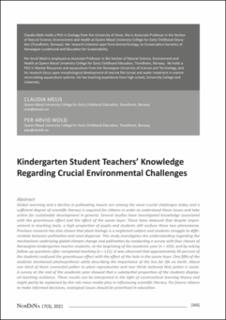| dc.contributor.author | MELIS, CLAUDIA | |
| dc.contributor.author | WOLD, PER-ARVID | |
| dc.coverage.spatial | Norway, Trondheim. | en_US |
| dc.date.accessioned | 2022-03-07T12:07:41Z | |
| dc.date.available | 2022-03-07T12:07:41Z | |
| dc.date.created | 2021-10-26T08:50:59Z | |
| dc.date.issued | 2021 | |
| dc.identifier.citation | Nordic Studies in Science Education. 2021, 17 (3), 265-276. | en_US |
| dc.identifier.issn | 1504-4556 | |
| dc.identifier.uri | https://hdl.handle.net/11250/2983405 | |
| dc.description.abstract | Global warming and a decline in pollinating insects are among the most crucial challenges today and a sufficient degree of scientific literacy is required for citizens in order to understand these issues and take action for sustainable development in general. Several studies have investigated knowledge associated with the greenhouse effect and the effect of the ozone layer. These have deduced that despite impro-vement in teaching tools, a high proportion of pupils and students still confuse these two phenomena. Previous research has also shown that plant biology is a neglected subject and students struggle to diffe-rentiate between pollination and seed dispersal. This study investigates the understanding regarding the mechanisms underlying global climate change and pollination by conducting a survey with four classes of Norwegian kindergarten teacher students, at the beginning of the academic year (n = 103), and by asking follow-up questions after completed teaching (n = 111). It was observed that approximately 40 percent of the students confused the greenhouse effect with the effect of the hole in the ozone layer. One fifth of the students mentioned photosynthesis while describing the importance of the Sun for life on Earth. About one third of them connected pollen to plant reproduction and two thirds believed that pollen is seeds. A survey at the end of the academic year showed that a substantial proportion of the students display-ed teaching resilience. These results can be interpreted in the light of constructivist learning theory and might partly be explained by the role mass media play in influencing scientific literacy. For future citizens to make informed decisions, ecological issues should be prioritised in education. | en_US |
| dc.language.iso | eng | en_US |
| dc.publisher | Naturfagsenteret | en_US |
| dc.rights | Navngivelse 4.0 Internasjonal | * |
| dc.rights.uri | http://creativecommons.org/licenses/by/4.0/deed.no | * |
| dc.subject | Barnehagelærer | en_US |
| dc.subject | environmental challenges. | en_US |
| dc.title | Kindergarten Teacher Students’ Knowledge Regarding Crucial Environmental Challenges | en_US |
| dc.type | Peer reviewed | en_US |
| dc.type | Journal article | en_US |
| dc.description.version | publishedVersion | en_US |
| dc.rights.holder | ©2021 C. Melis; P.-A.Wold | en_US |
| dc.subject.nsi | VDP::Matematikk og naturvitenskap: 400 | en_US |
| dc.subject.nsi | VDP::Mathematics and natural scienses: 400 | en_US |
| dc.source.pagenumber | 265-276 | en_US |
| dc.source.volume | 17 | en_US |
| dc.source.journal | Nordic Studies in Science Education | en_US |
| dc.source.issue | 3 | en_US |
| dc.identifier.doi | 10.5617/NORDINA.8087 | |
| dc.identifier.cristin | 1948421 | |
| cristin.ispublished | true | |
| cristin.fulltext | original | |
| cristin.qualitycode | 1 | |

